
Matt Edmondson: “It was the most direct version of a thought being downloaded from my brain that I’ve ever experienced.”
Having taught himself to write/produce songs, the BBC Radio 1 presenter collaborates with some famous friends on his new podcast
Given the gift of time during lockdown, BBC Radio 1 presenter, television personality and board game creator Matt Edmondson decided to add another string to his already comprehensive bow and dedicate himself to writing and producing songs. Having mastered the basics, the next step was to reach out to some of his famous contacts and convince them to write a song with him. The results can be heard on Edmondson’s thoroughly enjoyable new podcast Not Another Love Song.
What starts out as a chat between Edmondson and his weekly guest, including James Arthur, Sigrid, Tom Grennan and Griff, soon becomes a co-writing session. Topics that naturally crop up in the conversations, things like suffering from hay fever or box set binging, form the inspiration for the lyrics. The raw vocals are then taken back to “The Lab” (Edmondson’s spare bedroom) where they are made into fully-fledged, albeit slightly tongue-in-cheek, pop songs, before being presented back to his writing partners.
As well as gaining an insight into the way these chart sensations approach songwriting, what comes shining through is Edmondson’s ability to hold his own in such lofty company. Along the way, he also provides a look at his production process, giving listeners plenty of tips that will help even the most experienced songwriter. Feeling thoroughly impressed and inspired, we jumped on Zoom to find out more…
Click here for more interviews

Matt Edmondson – Not Another Love Song
“I’ve always played music on the radio and I’ve always liked but I would take what was baked and just enjoy that and I would never be able to split it up in my head into, ‘Oh that’s a bass…’ Even a word like ‘baseline,’ when people would say them, I didn’t know what they were talking about. I’d never been able to unbake the cake in my head. Then, for my radio show, we had a thing where Example, who makes big summer bangers, was coming in to co-host. We had three or four weeks with him and I thought it would be a good idea to get the Radio One listeners to help us make a big summer banger and it worked really well.
“He said, ‘Okay, we’re gonna go and make this song.’ He had a studio at the time in West London, and he had this producer Andy Sheldrake that he worked with. Example is the ideas guy and Andy helps deliver that idea on a technical level. I was there as a second ideas guy, finding things out.
“Andy dragged in this bit of audio and he turned to a synthesiser, it was a Juno-106, and he played a note, a bassline underneath. I was like, ’Oh my god, it sounds like a song!.’ The guy’s played one note and then he played another note of a chord progression and I was like, ‘I’m in a song. It’s happening now.’”
What happened next?
“We spent a couple of hours there and I was saying, ‘I can hear this thing in my head,’ and I was pitching him little melodic ideas. I was saying, ‘In my head, it sounds like a bell,’ and he’d bring up a bell sound and put it in. It was the most direct version of a thought being downloaded from my brain that I’ve ever experienced. This was, ‘I’ve just had a thought and now it’s playing back to me on a computer.’ And I was like, ‘This guy’s got some kind of a superpower. How’s he doing this?’ And then I wrote these jokey lyrics and I was saying, ‘I can hear this melody,’ and Example was doing this as well. He was like, ‘I think it should go like this.’ And I’d say what the lyrics of that could be.
“I guess the thing that I thought everyone could do was hear a melody and then immediately know what words or syllables to say.’ At the end of it, the producer Andy said the most dangerous thing you could ever say to me, which was, ‘Have you done this before?’ And I was like, ‘No,’ and he said, ‘You’re good at that, the lyrics and the melody. You’ve got it.’ I was like, ‘Doesn’t everybody do that when they hear a chord progression? Think of a tune and lyrics over the top.’ He was like, ‘No, that’s a skill.’
“That seemed crazy to me, but he said the songwriting bit is the bit that he was struggling with and he’s more of a facilitator and invited me back to try and write a real song.”
And you took him up on that offer?
“I did not need to be asked twice. I was there the next day again. I would come in and, on the tube, I’d think up melodies and then I would watch Andy produce these songs and I found some people on Twitter that could sing and I was very much there having a play. I would see him using all these tools that I did not know how to describe or what they did, but they were making things sound better. I just asked him questions like, ‘What have you done there?’ ‘Why are you doing that?’ ‘What’s this?’ I was probably very annoying and he was extremely patient with me.
“What I wanted to do was see this guy every day but he’s got a job and he can maybe see me one day a month. So I thought, ‘I’m gonna have to learn how to do it,’ and so I got GarageBand up on my computer, I’ve never played an instrument before, and I thought ‘Right let’s try to figure this out.’ As anyone who’s ever tried to start something from scratch they know nothing about knows, it was incredibly painful. I was dreadful at it. I literally didn’t know what I was doing. I played about with that for six months on and off and then I was like, ‘Right, I’m gonna get Logic now.’ That opened up a whole new world, like stepping into a spaceship and not knowing what anything did. And then I just watch loads of YouTube videos.”
At that point were you starting to think about doing something more with your new skills?
“I thought, ‘If I had some time I could get into this,’ I already loved it and it was all I was thinking about. Every waking minute I was watching videos, my wife thought I was having a breakdown. She was like, ‘You’re going to write songs now?’ I was like, ‘Yeah, I am actually.’ I’d never shown any interest in this at all and I turned back from this one day, saying ‘This is what I’m going to do.’ It was a very transformational experience for me.
“When I had any spare time: in the bath, on the toilet, on the tube… I think I was the only person in the history of history that bought YouTube premium so I could offline videos for the tube. I just used to watch Logic tutorials. Then, when the pandemic happened, I found myself with loads of time, and I thought, ‘Well, it’s now or never,’ you know. The universe has given me, in this terrible time, loads of spare hours. So let’s try and do something and that’s where the idea for Not Another Love Song came from. I thought that I had to make and finish songs, otherwise I’d keep noodling around and never achieve anything.
“I set myself a task to make one song, that I recorded with Maisie Peters. I didn’t know if it would work, how do you know whether you can write a song with somebody? I did the one with Maisie Peters and it took me probably a month-and-a-half, nine till seven every day, trying to figure out how to make a song until I finished it. And then I was like, ‘I’ll do this nine more times.’”
As well as the technical stuff, did you also have to learn songwriting language about keys, chords, notes and time signatures?
“That was all part of the learning and I spent as much time looking at the technical stuff as I did the theory stuff. I found it extremely baffling, to begin with. And actually, I feel like I want to go and teach music lessons in school and say, ‘Hey kids, here’s all the stuff you need to know to be able to make music,’ rather than stuff that they try to teach. Because actually understanding that there are these different keys and if you sort of stay within them, things are going to sound pretty good. Also, you’re going to be able to work out harmony through the same maths; whatever scale you’re in, it’s the same intervals.
“I’m writing pop songs, there might be the odd sexy seventh chord in there, but it’s mostly major and minor chords and there’s only seven of them, one of which you’re never going to use probably, in a key. Now everything’s quite simple and once you know what key you’re in, technology can help with that massively… There’s loads of software, you can just drag some audio and it’ll say, ‘Oh, I think you’re in B flat minor.’ Once you know that, it’s incredibly easy. The technology is there, if you can’t play an instrument, you can still write music. If you can think it then you can get it out of you.”

Matt Edmondson: “The technology is there, if you can’t play an instrument, you can still write music.”
Were there any particularly useful tools?
“There were two things that really helped with that. One is I bought a MIDI keyboard that allows me to transpose everything with the touch of a single button. So now I can play in any key very easily. The other thing that really helped was that Logic has an app called Logic Remote and it’s one of the most amazing music tools I’ve ever come across. It has these things in it called Chord Strips. I struggled early doors with chords and chord inversions. It’s sort of taught that you take the root note and then go up. What Chord Strips did was it takes all the inversions and you can hear the chords you want. So I could hear the sound in my head and then I could just audition chords really easily. I found that useful.
“I watched a lot of stuff on music theory and I’ve got more than a basic understanding of theory. It’s all on YouTube but it just took time. The first six months felt impenetrable but you find little tools on the way or you just understand it.”
You mentioned your ability to come up with lyrics quickly and that really stands out when listening to the podcast…
“Yeah, that’s the bit that I do not find a challenge at all. My whole job has been around words and language and I think I have a really unusual relationship with words because for the radio and telly, you often have to talk for very specific lengths of time. So I’ve got a really good sense of my own words over time, if that makes sense? Like if you said, ‘Talk for exactly 30 seconds and say this thing,’ I could and then if you said ‘I need you to say the exact same thing, but I need you to do it over a minute,’ I could. I honestly thought everyone did it. It doesn’t feel like a unique or authentic skill.
“If you find something easy, it sometimes takes a while to believe that it has any value. Like people who are really good organisers and really good at doing logistics, I can see the value in what they do because I can’t do it. My life and brain are in chaos. They sometimes think it’s really obvious. They will just schedule these things in this way and don’t have to think about it. I’m a bit like that with the words.”
Did that take away the imposter syndrome someone else might have experienced when sitting next to some of the biggest names in music?
“I had the ultimate get-out-of-jail-free card in terms of the tone of it. I was very honest, I didn’t say ‘Hey, I’m a songwriter, and we’re gonna write the best song ever.’ My whole energy was like, ‘Hey, let’s just give this a go.’ The worst that can happen is I pitch things that are bad and they say, ‘No, that’s bad,’ and we laugh about it and we still get a song at the end. That’s the worst that can happen. Or that I make a song and it’s shit.
“I think, had I done the first one and it had been rubbish, I would not have continued. The Maisie one wasn’t rubbish, actually, it’s good and it gave me confidence. And my thing was, it doesn’t matter if it takes me six months between recording this song and delivering it back to them. I will just wait until it’s good. I felt very relaxed. These are people that know what the project is.
“The lyric thinking thing, it’s either going to be funny because it’s bad or funny and satisfying because it’s good. That was the only bit I felt confident about, that I’d be able to deliver funny lyrics and I’d be able to shape the vision of what the song is going to be. The bit I was very not sure on was once they send me the vocal, what the hell would I do with it?”
You say the lyrics are funny but they’re also very clever and don’t take the obvious paths and you often improve on what is pitched to you by the artists on the podcast…
“Well, that’s nice of you to say. The thing I like most about the whole process… I love listening to podcasts about songwriting or watching documentaries about them, but they’re always a bit rose-tinted. The truth of it is that it’s an odd tussle of ideas where you’re both aspiring to the same thing, and I think that’s with anything that’s creative and collaborative. It’s ‘Yes, and?’ all the way through. It’s, ‘I like what you’ve just done but let’s build on it.’
“I’ve never heard two strangers tussle an idea about and then both agree that that’s the best version of it. And what I like is that you can hear us in awe of each other sometimes and surprise each other. Like, ‘That is a killer line you’ve just come up with,’ or, ‘I love the essence of it, but maybe we can just tweak it so it does this other thing.’ Me being able to do that comes from collaborating with lots of people and probably, being a bit of a control freak myself.”
Is there a part of you, and part of the podcast’s raison d’être, that wants to help others learn how to write and produce songs?
“Well, I hope so. There’s a bit in the episodes, between us writing the song and then me playing it back to them, where I try and explain what did I learn and what did I do. I love it when people share, ‘Oh, this is how that thing was made,’ and I think a lot of people coming to this won’t have ever thought about writing a song before. I’m slowly peeling away these layers of mystery for myself and I want to let people come on that journey with me. What I will say is, if I can do this, literally, anybody can.
“I’ve got zero experience and many people will say no actual talent. If you sat me in front of a piano, I couldn’t play you anything. But we live in an amazing time where if you want to do anything, someone has done a YouTube video about it. It’s sort of that 10,000 hours thing; if you just repeatedly have a go at doing something and can get past the phase where you are so bad that you think you’re never going to be able to do it. Keep going and, eventually, it will sort of happen.”
There are a few episodes of the podcast yet to be released but what ambitions do you have next when it comes to songwriting and production?
“I don’t know is the honest answer. If I’d have known how much work this project was going to be, I probably wouldn’t have done it. I thought, ‘How hard is it going to be?’ turns out it’s really hard to make an album. The words thing, I was happy with that. The producing, that is hard to do. Mixing, oh my God, it was so hard. I was so naive about it and the mastering. I’m still in that phase, I haven’t finished mixing all the songs yet. So I don’t I don’t know really what I want to do with it.
“I’m not going to stop doing it. My favourite thing is to go and sit at the computer or sit at the keyboard and write songs. I do it all the time. If I’m on the tube, I’ll just write a song on my notes because it’s an enjoyable thing to do. I don’t quite know what the next step is. I think I’d like to try and write some real songs and muck around with those. I still have a bit of the imposter syndrome with the production side of things because it was very much on my terms before. They’d send me the vocal and I’d figure it out in my own time.
“Interestingly, the song which will come out last because she’s not sent me the vocal yet, was with Raye and she wanted us to write to a thing. So when we were doing the session on Zoom, she was telling me what she wanted and I was producing it on the fly. That was quite an interesting experience for me because I realised that I know how to do this. So I think I’m now at the point where maybe I could go and sit in a room with someone and say, ‘Hey, what kind of song do you want?’ and make it.
“The beauty of this project is that I’ve had a go at pretty much everything. I’ve done a house record with Becky Hill, I’ve done an acoustic piano song with Brad [Simpson] from The Vamps, I’ve done like full-on big impactful tearjerker chorus stuff with Tom Walker… so I reckon I could do something but I have no ambition beyond getting this project done.”
Lastly, are there any pitfalls you experienced that you can help others avoid?
“If you’ve never ever done it before and you load up GarageBand it’s going to be confusing and the thing that’s going to be confusing about it is anything you play isn’t going to be in time. Lesson number one, learn about quantization, which is the computer timing stuff for you. Because actually, if you can play a single note, on a slow rhythm, on a 4/4 beat, your brain will tell you, because you’ve heard enough songs, what note to play next. It just will and you can find it on your Mac keyboard. You can quantize it and loop it, all you need is four notes and you can write a song to that. That’s basically what most songs are and then everything else on top of that is a bit of a bonus. So start there and then find some YouTube people that you think can do the job. It’s very hard, that first six months is hellish. You will figure it out. If you want to do it, you’ll do it.”
Not Another Love Song is available weekly on Apple, Spotify, Acast and all podcast providers.
Click here for more interviews


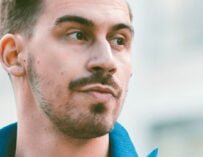
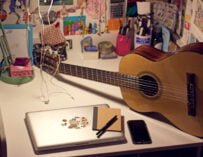
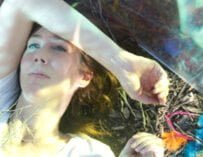



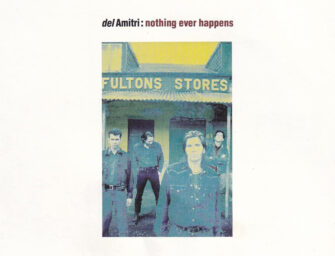

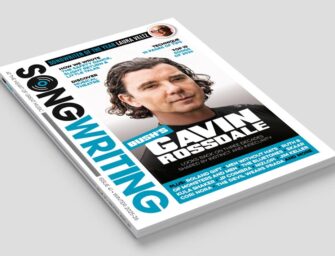
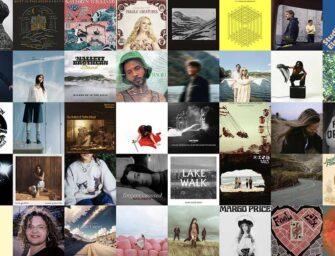






















Related Articles